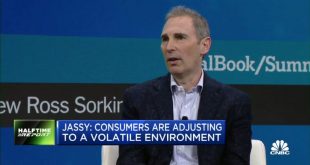Bill Gates, co-chairman of the Bill and Melinda Gates Foundation, speaks during the Earthshot Prize Innovation Summit in New York, US, on Wednesday, Sept. 21, 2022. The first-ever Earthshot Prize Innovation Summit brings together climate leaders to showcase transformative solutions that repair and regenerate the planet.
Bloomberg | Bloomberg | Getty Images
Rich countries are going to have to step up their spending to accelerate the innovation, development and deployment of technologies that will help the world reduce greenhouse gas emissions, according to Bill Gates.
Developing economies are responsible for the majority of greenhouse gas emissions that cause global warming, but poorer countries should not be expected to slow the development of their economies for the sake of reducing global greenhouse gas emissions, according to Gates, who the billionaire co-founder of Microsoft and also more recently the founder of Breakthrough Energy Ventures, a leading climate technology investment company.
It is the responsibility of the richest countries, like the United States, which owe much of their own current wealth to the burning of fossil fuels, to fund the innovation process of technologies to decarbonize all sectors of the economy, Gates says.
Gates lays out this assessment in an essay titled, “State of the Energy Transition,” which published on his personal blog on Tuesday. In the essay, Gates gives a brief retrospective of how he sees the world responding to global warming in the 15 years since he started learning about climate change.
His assessment is encouraging in some respects and bleak in others. He’s generally encouraged by how some governments and private companies have realized the urgency of climate change and begun investing accordingly. He’s also honest about how the world is not moving fast enough or unified enough to meet the challenge, one which he admits is the hardest and most existential humanity has ever faced.
Low- and middle-income countries are building aggressively to achieve the standard of living their people aspire to—and they should be. Many countries in Europe and North America filled the atmosphere with carbon to achieve prosperity, and it is both unrealistic and unfair to expect everyone else to forgo a more comfortable life because that carbon turned out to change the climate.
Bill Gates
Microsoft co-founder, Breakthrough Energy founder
“The world still needs to reduce annual greenhouse gas emissions from 51 billion tons to zero, but global emissions continue to increase every year,” Gates writes in his essay, which published as the Breakthrough Energy Summit kicks off in Seattle, Washington.
“If you follow the annual IPCC reports, you’ve watched as the scenarios for limiting the global temperature rise to 1.5 or even 2 degrees Celsius become increasingly remote,” Gates says, referencing the seminal Intergovernmental Panel on Climate Change reports published by the United Nations which serve as a benchmark for global progress each year.
To slow global warming and the extreme weather events that come with a hotter planet, all countries need to stop releasing greenhouse gasses, like carbon dioxide and methane gas, that trap heat in the earth’s atmosphere.
“The ultimate measure of success is global greenhouse gas emissions: we need to go from 51 billion tons a year to zero in the next three decades,” Gates says.
To do that, the world must create and deploy technology that enables the same economic activity as burning fossil fuels, but without releasing greenhouse gasses.
Manufacturing (of everything from steel, cement and plastic) bears the largest responsibility for greenhouse gas emissions, accounting for 30 percent of total emissions. Producing electricity accounts for 26 percent of global emissions, agriculture is responsible for 21 percent, transportation for 16 percent, and buildings for 7 percent.
The only solution, according to Gates, is to make alternatives that do not emit greenhouse gasses which are also both better and cheaper.
That process will have to be driven by richer countries, even though developing economies are responsible for most emissions.
“Low- and middle-income countries are building aggressively to achieve the standard of living their people aspire to — and they should be. Many countries in Europe and North America filled the atmosphere with carbon to achieve prosperity, and it is both unrealistic and unfair to expect everyone else to forgo a more comfortable life because that carbon turned out to change the climate,” Gates writes.
The amount that a cleaner alternative costs over the conventional, legacy alternative is what Gates calls the “green premium.” To bring down global emissions across the globe will require bringing the green premium to zero — that is, making clean alternatives available at cost parity to the fossil-fuel-burning alternative.
Government intervention may be required to speed this process along.
“I have more confidence in markets than many other people, but even I don’t think the market by itself can press reset on an entire economy in just a few decades,” said Gates. “We need a plan to speed the process up.”

 EU News Digest Latest News & Updates
EU News Digest Latest News & Updates



